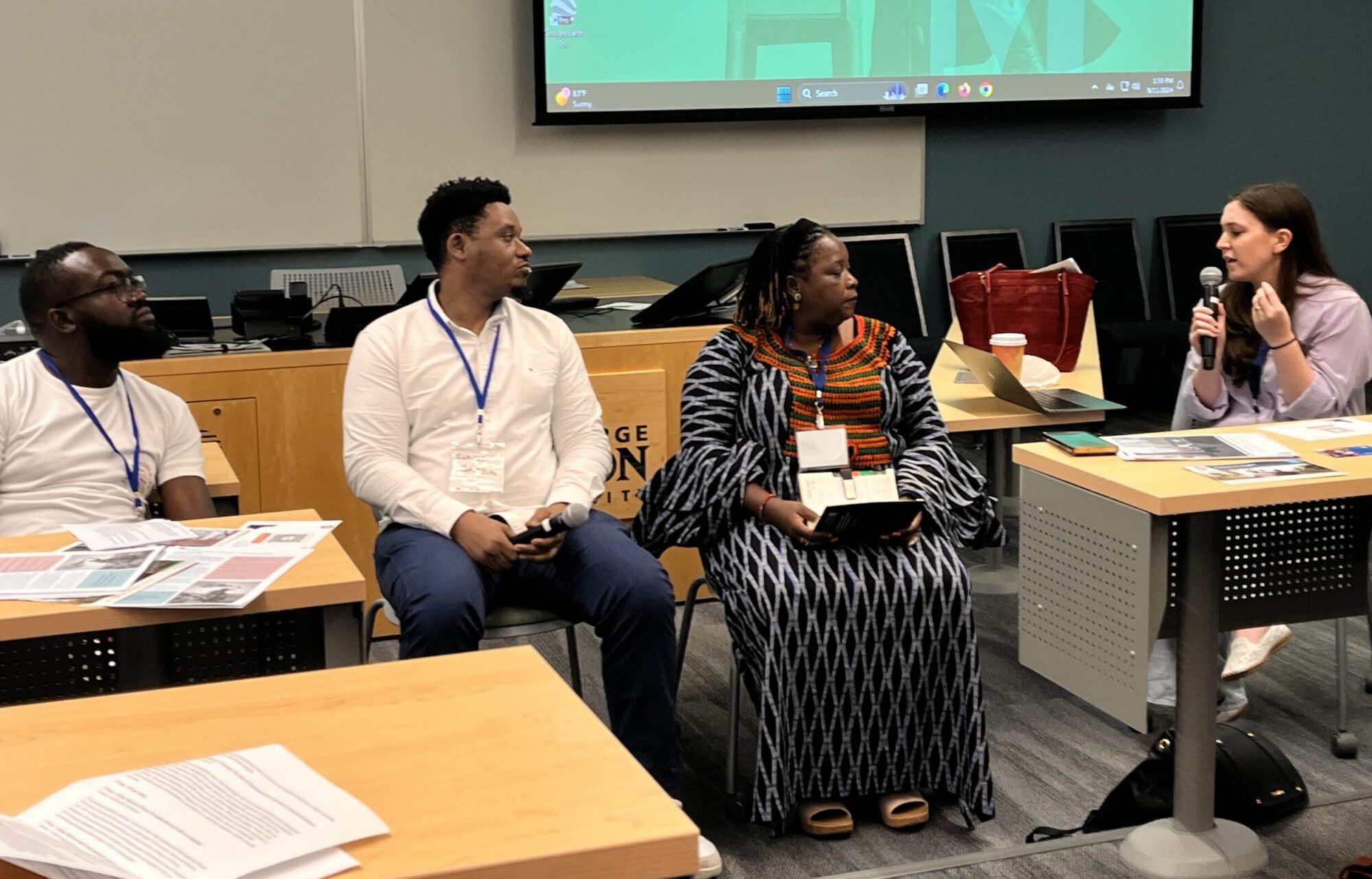One of the most exciting elements of September’s PeaceCon in Washington, D.C. was how it presented multiple opportunities to put our grantees front and center by placing the microphone in the hands of those proximate actors whose voices must be heard and heeded.
The event, organized by our partners at the Alliance for Peacebuilding, was themed Status Quo No More: Building Peace in a Time of Rising Conflict, which aligns with our Peacebuilding portfolio’s recognition that current approaches to peacebuilding and conflict prevention aren’t working.
Below is a summary of some of the sessions that were organized by or featured proximate actors.
What is the Future of Measuring Peace? Integrating Lessons Learned from Scholarship and Practice (Leslie Wingender, Senior Director, Peacebuilding, Humanity United; Aisalkyn Botoeva, Research, Evaluation, and Learning Specialist, Search for Common Ground; Leslie MacColman, PhD, Research Coordinator, Everyday Peace Indicators; Preston Lindsay, PhD, University of Manitoba; Madeleine Avignon, Country Director, Communities Organizing for Haitian Engagement and Development; Pamina Firchow, Founding Executive Director, Everyday Peace Indicators)
- This session laid out the lessons from Inclusive Rigor and the Grounded Accountability Model to ensure proximate voices are shaping and guiding what learning looks like in a way that elevates their power and shapes what the work looks like.
- Speakers also delved into how efforts on learning are often truncated and do not necessarily work together with other peace measurements to create more holistic forms of measurement that are multipurpose and serve the goals of all stakeholders including donors, implementers, policymakers, academics and everyday people.
- Donors, governments, and international NGOs need to examine how the definition and measurement of success should be driven by the communities most impacted.
Yes, We Know You’re Tired: How Peacebuilders are Addressing Care and Well-Being (Jesse Eaves, Senior Director, Peacebuilding, Humanity United; Kenneth Chomba, African Coaches Network; Laura Webber, Peacebuilding, Care, and Wellbeing Consultant; Alexis Flanagan, Co-Director, Resonance Network; Claude Gatebuke, Executive Director, African Great Lakes Action Network)
This session unpacked our assertion that wellbeing is mission-critical — not a “nice to have” but a “must have.” Wellbeing impacts the ability of people to connect and build trust and that is critical for peacebuilding and beyond. Using storytelling to create an experience of feeling seen and heard, participants unpacked important realities about care including:
- Simple acts matter and a “how are you?” can go a long way.
- Care can happen in the moment and it also takes planning, hence why we cannot approach well-being interventions using the traditional programming lens of indicators and short timetables.
- Being seen and heard allows us to use our agency and power.
- Care is a collective role, so understand the needs of people around you and don’t be afraid to ask how they are.
Building Trust In and Supporting Proximate Peacebuilders (Corie Walsh, Senior Portfolio Manager, Peacebuilding, Humanity United; Claude Gatebuke, Executive Director, African Great Lakes Action Network; Kenneth Chomba, African Coaching Network; Clotilda Andiensa Waah, Coordinator and Founder, Center for Advocacy in Gender Equality and Action for Development; Nick Zuroski, Manager for Policy & Advocacy, Alliance for Peacebuilding)
- This roundtable convened proximate peacebuilders, donors, law and policymakers, and practitioners to explore various challenges and opportunities to advance locally-led peacebuilding in conflict-affected and fragile states.
- In addition to sharing the themes of an upcoming report tying together the series’ main findings, the conversation recapped key thematic takeaways, including promoting the emotional and mental well-being of proximate actors, countering shrinking civic space, translocal relationship-building among peacebuilders and activists, and protection of peacebuilders and activists closest to conflict.
Walking the Talk: Organizing for Power and Care (Angela Maria Baez Silva, Peacebuilding Practitioner; Claude Gatebuke, Executive Director, African Great Lakes Action Network; Jason Ferenczi, Program Director and Operations Director, unRival Network; Kassamira Carter-Howard, Director of Programs, Resonance Network)
- This session featured an organic community of practice that sprung out of last year’s PeaceCon, where several of our grantees from around the world met each other and decided to continue meeting to explore how our organizations and networks can be better organized to not only achieve their mission but care for those doing the work in the process.
- The group sought to redefine the term “governance” to mean not just how we organize to get things done together, but also the seen and unseen agreements that allow us to accomplish a shared goal.
- Their conclusion through the discussion was that “good governance” means creating infrastructures for care that allow people to manifest their power and agency. In short, by organizing around care, we create more space for those doing the work to have their voices heard, feel agency in their work, and increase their power and resilience to make change.
At HU, our Peacebuilding portfolio’s guiding vision is an international system where peacebuilding is defined and driven by the agency and power of those proximate to conflict. We seek networks that flourish and enable collective action across peace actors and sectors. We want to change philanthropic practices (including our own) to elevate proximate voices, this includes funding, learning, and accompaniment practices. We want peace actors to experience physical and psychological safety, healing, and wellbeing. We want to see inclusive peace processes that reward those who do not wield weapons. In short, we seek to influence and catalyze the peacebuilding field to follow the lead of those most proximate to violent conflict.
This year’s PeaceCon presented an overall acknowledgment that the peacebuilding system has to change. We have a ways to go, but these moments take us away from the status quo and into a new way of engagement with proximate voices. We extend our gratitude and appreciation to our grantees and partners for their participation and extend a bow of thanks to Alliance for Peacebuilding for their efforts to make PeaceCon24 a success.
